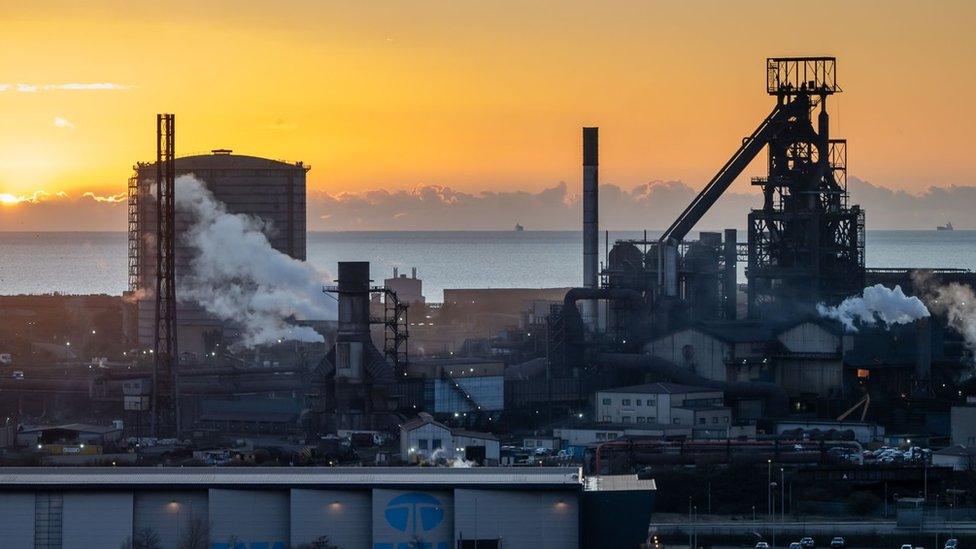Port Talbot steelworks: Thousands of job losses planned by Tata steel
- Published
- comments
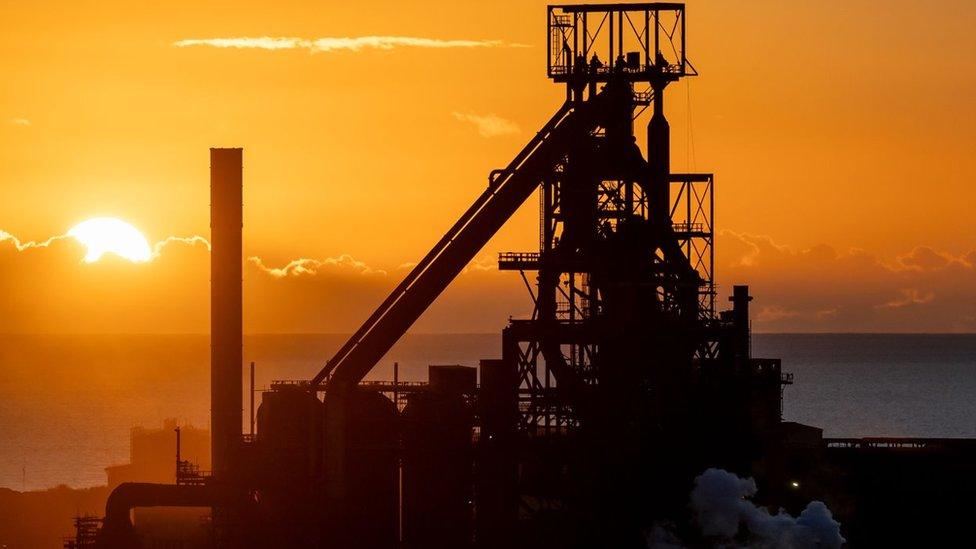
Tata Steel has announced 2,800 jobs will be lost, mainly at its steelworks in Port Talbot in the next 18 months
In the Welsh town of Port Talbot it feels like everyone is "connected" to the steelworks, the local MP says.
The massive factory is the biggest steelworks in the UK and one of the largest in Europe.
It employs about 4,000 workers out of a population of roughly 35,000 people.
Some families have worked there for generations, but now thousands of workers will lose their jobs.
Tata Steel, the company which owns it, says the plant needs updating and is losing a lot of money, so it has to make the cuts.
The factory dominates Port Talbot's skyline. It is the main employer in the town, so job losses will have a big impact.
Stephen Kinnock, Labour MP for Aberavon, which includes Port Talbot, describes the steelworks as "the beating heart of the economy and of our community".
Why are job cuts planned?
The company said the cuts, which will happen over the next 18 months were necessary to transform the factory and reduce its carbon emissions.
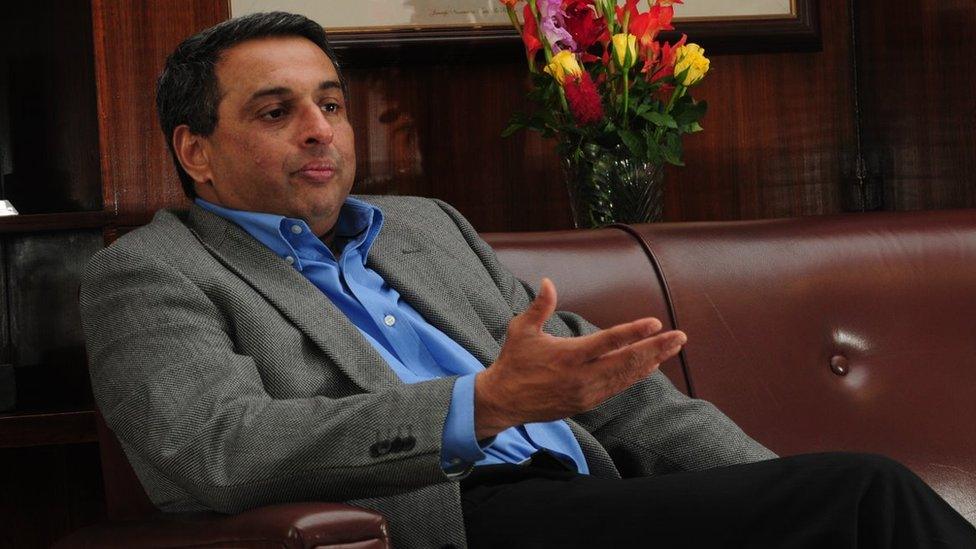
Tata Steel's boss TV Narendran says Tata spent about £5 billon to keep the steelworks going
Community, the union which represents many of the steel workers said Tata's plans were "unacceptable" and would be "devastating" for the men, women and children who lived and worked there.
Tata Steel's boss, Chief Executive TV Narendran, said the Indian company would help workers to retrain and find new jobs.
He said while cutting jobs was a difficult decision to make, "we believe it is the right one".
Wales' First Minister Mark Drakeford has written to the UK's Prime Minister Rishi Sunak asking for an urgent meeting about the job cuts.
How important is steel in the UK?
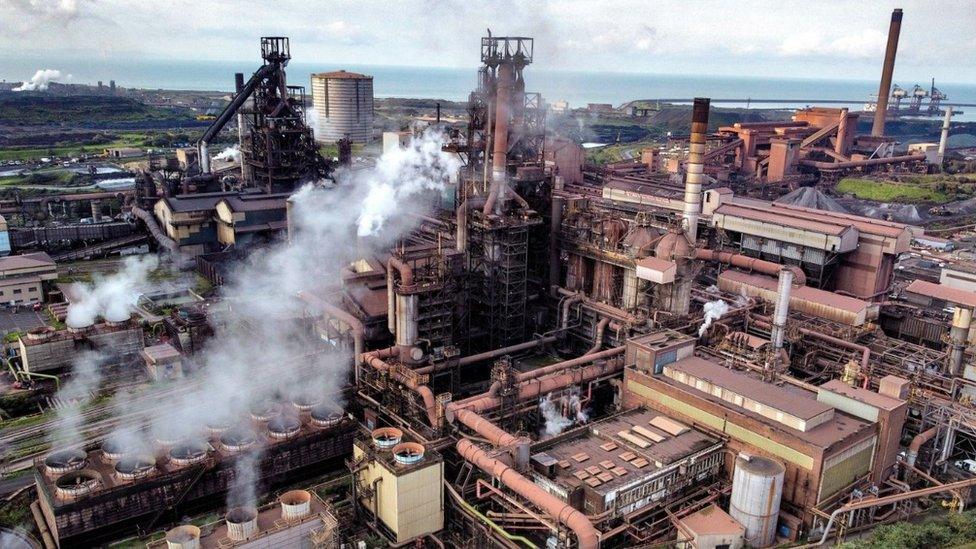
Tata Steel says the blast furnaces are nearing the end of their working life
Steel is an incredibly useful material, used in many everyday items from cars to buildings and electrical appliances. It is also used for building ships and making weapons and is therefore important to the military.
In 2019, the UK produced seven million tonnes of steel, whereas, the world's leading steel producer, China, produced 996 million tonnes in comparison.
But steelmaking can have a big impact on the environment.
Port Talbot's steelworks produces as much as 22% of Wales' carbon emissions every year, and the factory is the UK's biggest single carbon polluter.
Tata Steel says it wants to make the Port Talbot factory more environmentally friendly.
It also says the factory is nearing the end of its working life and has been losing a lot of money.
"Over the last 15 years, I think we've invested something like £5bn to keep the business going. So it's not like we've given up in a hurry or that we've not tried hard enough," Tata boss TV Narendran said.
His plan involves using different technology and rather than making new steel - using raw materials dug up from the ground - the factory would mainly melt down scrap metal, which critics say would have to be imported.
Why will people lose their jobs?
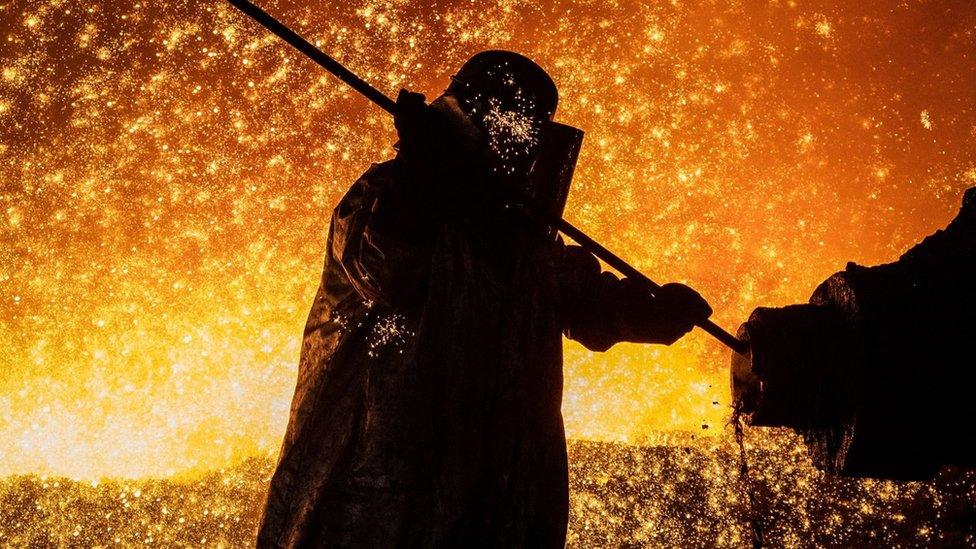
Tata Steel plans to close two of its blast furnaces in Port Talbot and to replace them with electric furnaces
Tata Steel says it plans to close two of its blast furnaces and replace them with electric ones.
Blast furnaces are chimney-like structures used to separate iron from a mineral called iron ore, as part of the process for making steel.
They require huge amounts of energy to run and operate at very high temperatures to produce a chemical reaction and that process creates a lot of waste carbon dioxide.
Tata Steel says an electric furnace is a better option because it will reduce the UK's overall carbon emissions, and reduce Port Talbot's emissions by 85% a year.
Electric furnaces require fewer people to operate them than the factory's current blast furnaces.
As a result, the company says it plans to close 2,500 roles across the UK over the next 18 months.
Most of these roles would be lost in Port Talbot with a further 300 job losses possibly planned in three years' time at its Llanwern site in South East Wales, the firm said.
Who will be affected by Tata Steel's job losses?
The job closures announced are UK-wide, but Port Talbot is likely to feel the biggest impact.
"Not a single household within this Aberavon constituency is not connected to our steelworks," says the local Labour MP, Stephen Kinnock.

After hearing the news steel worker Ieuan Eltham said: "Nobody knows where they're gonna go from here"
"It's the jobs, it's the future for families."
Ieuan Eltham left school at 16 when he got his first job at the Tata Steel works in Port Talbot. Now 29, he says the plant is "all I've ever known".
He has an 11-month-old daughter and says he and his family are "devastated" by the news.

Rhydian Mizen said making steel in the UK was important from a national security point of view for use by the British Armed Forces
Rhydian Mizen, who worked in the Port Talbot steel works for 38 years, said: "I can't imagine Port Talbot without the steelworks.
"It's so important to be producing steel here for national security, now steel will have to be imported," he added.
Casey Jones lives in Port Talbot and said: "It's very sad, we've got a lot of people we know at Tata and the steelworks, this town, everything is going to die, because we rely on the steel."

Casey Jones says the steelworks provides lots of local jobs but also produces a lot of pollution
She says she has a "love-hate" relationship with the factory.
"It's really bad for the environment, but again it generates so many jobs, therefore everyone is going to be impacted."
Gavin Moule, who is the third generation in his family to work at Tata Steel said: "It's devastating for the community. This runs deep."
He said all the workers supported using more environmentally friendly production methods, but they had hoped for a gentler change, that did not involve such wide scale job losses.
The environmental arguments
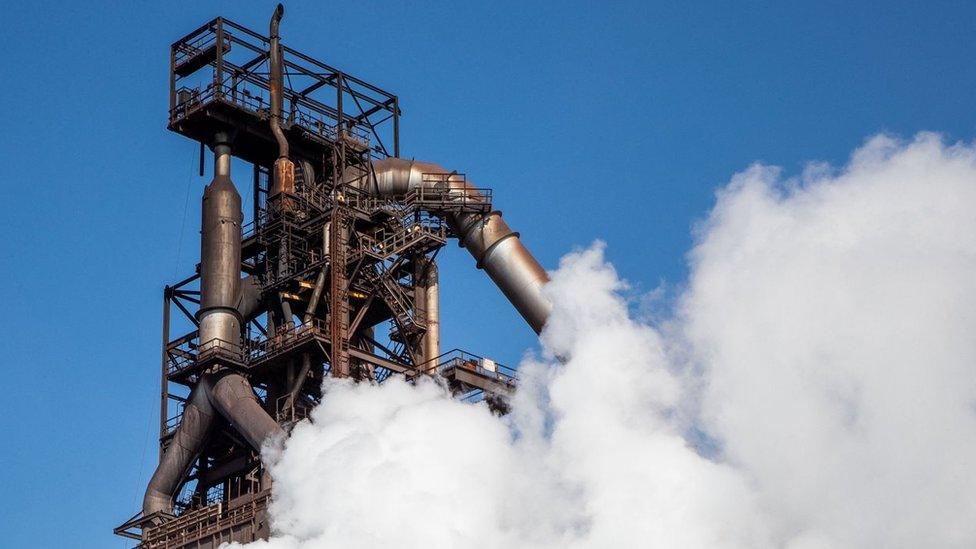
Making steel is a highly polluting activity
Kathy Oakwood, from Friends of the Earth campaigners in Neath Port Talbot, said she wants to see steelmaking become more environmentally friendly, but disagreed that jobs had to be lost.
"Life is never ideal and we have to do it as manageably as we can with as little impact for families."
Nia Griffith, Labour MP for Llanelli, where Tata has a smaller factory, said: "It makes absolutely no sense to me at all to be importing steel, which will be made creating just as many emissions as if we were making it here."
She said the planned job cuts would have a negative impact on the whole of UK steel making and would put thousands of jobs at risk in the whole of South Wales.
Shutting the two blast furnaces in South Wales will make the UK reliant on steel imports for an unknown number of years, Wales' Economy Minister Vaughan Gething said.
"Transferring Welsh jobs and emissions to another part of the world", would not result in a total carbon "reduction for the planet" he added.
How have politicians reacted?
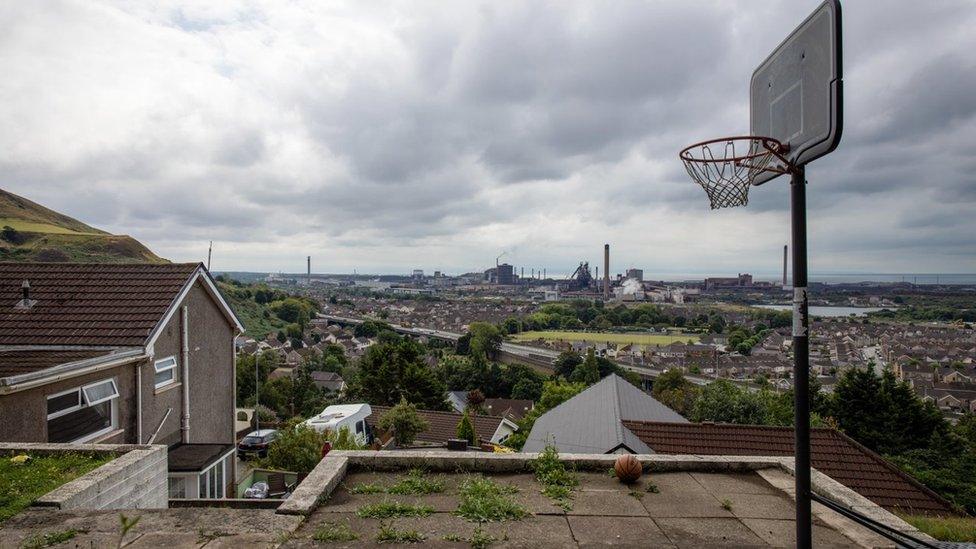
Wales' First Minister Mark Drakeford (Labour) says he is going to fight hard to save more jobs in Port Talbot
The UK government said on Friday: "We are determined to secure a sustainable and competitive future for the UK steel sector."
Towards the end of 2023, it provided £500 million to help the factory in Port Talbot become more environmentally friendly, but it warned at the time jobs would be put at risk.
Prime Minister Rishi Sunak said without the government's support, the entire steelworks was at risk of being closed, which would have led to 8,000 jobs being lost.
His spokesman said it was still a "very worrying time for employees and their families" though.

The UK Prime Minister Rishi Sunak says in 2023 the government put £500 million into helping the steelworks
"Today is an incredibly difficult day for Wales," the Welsh Conservative leader in the Senedd Andrew RT Davies said.
"I remain unconvinced that a blast furnace could not be kept open during the transition to the arc furnaces, protecting many jobs in the short to medium term.
"This needs to be explained fully as to why this hasn't been done by the company," he added.
Tata Steel said keeping two blast furnaces open while moving over to electric technology was "financially unaffordable".
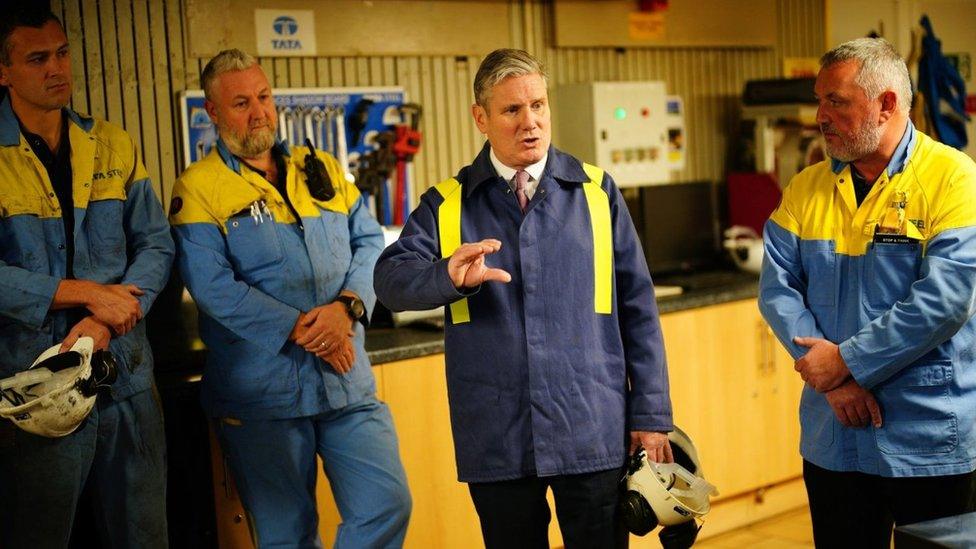
The Labour Party leader Sir Keir Starmer visited Port Talbot's steelworks in October and repeated on Friday that he was "committed to the future of steel in the United Kingdom"
Wales' First Minister Mark Drakeford (Labour) has written to the Conservative prime minister Mr Sunak, asking for "an urgent discussion" about the planned job cuts.
In an interview with the Welsh-language TV channel S4C he said: "We're not going to give up on the effort to keep more jobs and have a fairer transition period for people in Port Talbot."
The Labour Party leader Sir Keir Starmer said his party was "committed to the future of steel in the United Kingdom".
He said he was "very concerned" and attacked the government for agreeing to a plan involving thousands of job losses, despite there being an alternative plan available that could avoid job losses on this scale.
Mr Drakeford said the Welsh government "does not see this decision as final" and has urged the UK government to restart negotiations to try to save more jobs.
